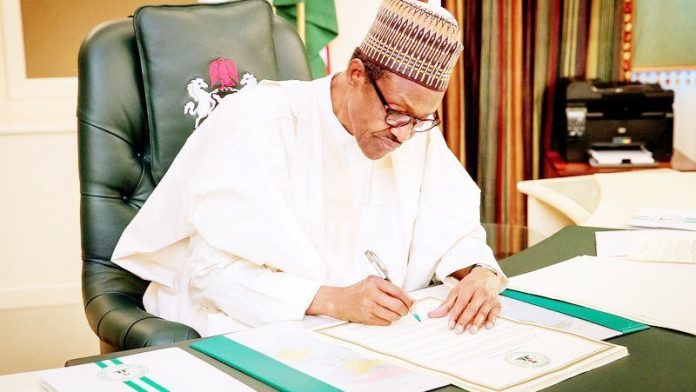The European Union (EU) Election Observation Mission (EOM) to Nigeria on Saturday night tweeted a summary of its report on the 2019 general election, Igbere TV reports.
This comes amidst controversies and distortions of what the EU said by some media agencies across the country.
Apart from highlighting flaws in the election, the EU recommended 30 points for ratification ahead of 2023 election.

See Full Report:
The European Union Election Observation Mission (EU EOM) to Nigeria today released its final report on the 2019 general elections, which contains 30 recommendations to improve future electoral processes. The mission concluded that the systemic fallings seen in the elections, and the relatively low levels of voter participation, show the need for fundamental electoral reform.
“Such reform needs political leadership that is dedicated to the rights of Nigerian citizens, and an inclusive process of national dialogue involving state institutions, parties, civil society and the media”, said EU Chief Observer, Maria Arena, at a press conference in Abuja. “This needs to be urgently undertaken to allow time for debate, legislative changes and implementation well advance of the next elections”, she added.
Overall, the EU EOM concluded the elections were marked by severe operational and transparency shortcomings, electoral security problems and low turnout. Positively, however, the elections were competitive, parties were able to campaign and civil society enhanced accountability. Leading parties, the EU EOM said, were at fault in not reining in acts of violence and intimidation by their supporters and abuse of incumbency at federal and state levels. The EU EOM, report stated that, except for federal radio, state media primarily served the interests of the president or the governor at state level. Journalists were subject to harassment, and scrutiny of the electoral process was at times compromised with some independent observers being obstructed in their work, including by security agencies.
The EU EOM noted that INEC worked in a difficult environment and made some improvements, such as simplifying voting procedures. However, considerable weakness remained. Operational deficiencies led to the postponement of the elections, there were insufficient checks and transparency in the results process, as well as a general lack of public communication and information.
The elections became increasingly marred by violence and intimidation, with the role of the security agencies becoming more contentious as the process progressed. The EU EOM reported that this damaged the integrity of the electoral process and may deter future participation. During collation of the federal results, EU observers directly witnessed or received reports of intimidation of INEC officials in 20 states.
While the legal framework broadly provides for democratic elections and some improvements were made to the Constitution, various legal shortcomings remained, including in relation to the use of smart card readers. The EU EOM also noted the suspension of the Chief Justice by the President a few weeks before the elections, which it said was seen to lack due process and reportedly undermined judicial independence.
Other issues highlighted in the report include: conflicting and late rulings on electoral disputes that undermined opportunity for remedy and created uncertainty; the dysfunctional regulation of political finance; very few electoral offences resulting in arrest or prosecution; problems with the collection of permanent voter cards; and the further fall in the number of women elected.
Positively, however, the report noted that parties and candidates were able to campaign, with freedoms of assembly, expression and movement largely respected. The EU EOM also emphasised the effective role played by civil society organisations in promoting election reform and positively contributing to the accountability of the process.
The report makes 30 recommendations for consideration, but prioritises the following seven:
- Strengthen INEC procedures for the collation of results to improve integrity and confidence in electoral outcomes;
- Establish requirements in law for full result transparency, with data easily accessible to the public;
- Considerably strengthen INEC’s organisational and operational capacity, as well as its internal communication;
- The inter-agency body responsible for electoral security to work more transparently and inclusively, with regular consultations with political parties and civil society;
- Introduce a legal requirement for political parties to have a minimum representation of women among candidates;
- Electoral tribunals to also cover pre-election cases in order to improve access to remedy and to avoid petitions being taken to different courts at the same time;
- Reform the licensing system for the broadcast media to provide for media pluralism and diversity in all of Nigeria’s states.
Following an invitation from INEC, the EU EOM was present in Nigeria between 5 January and 7 April 2019. It observed the Presidential and National Assembly elections on 23 February (see statement), the Governorship and State House of Assembly elections on 9 March (see statement), as well as supplementary governorship elections on 23 March (see statement). The mission’s 40 long-term observers went to all 36 states and the Federal Capital Territory. The mission’s mandate was to observe all aspect of electoral process and assess the extent to which the elections complied with Nigeria’s international and regional commitments for elections, as well as with national legislation. The EU EOM was independent of EU institutions, the Delegation of the European Union to Nigeria and EU member states.
The full report is available at www.eueomnigeria2019.eu
Download the 88-page report here…







